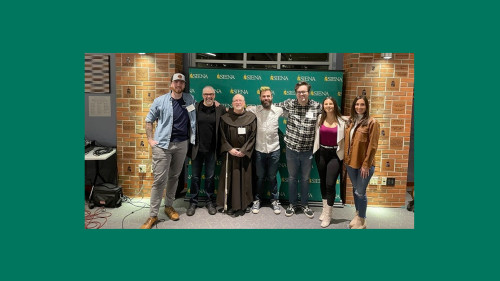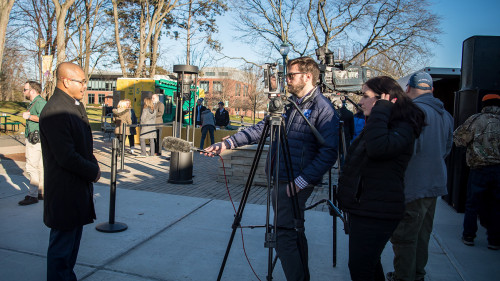

For more photos from the event, click here.
Eighty-five percent of Americans with diabetes get medical treatment. Only 10 percent of those with a substance use disorder receive treatment.
This disheartening statistic illustrating the shame that still surrounds addiction was shared by Michael Botticelli ’80 at his March 29 talk on “Why Community Matters,” part of the School of Business’ Lewis Golub Executive Lecture Series.
Botticelli recently left his position as director of the White House Office of National Drug Control Policy. The Obama Administration’s efforts were based on a balanced approach to public health and public safety. He was recently named the first executive director of Boston Medical Center’s new Grayken Center for Addiction Medicine. He said his experience at Siena has guided his life and work.
His talk drew on his professional experience in helping to address the nation’s drug crisis, particularly the alarming opioid addiction epidemic.
One of the first things Botticelli shared with the audience was that he himself is marking 28 years of recovering from a substance use disorder. He said as a young professional he “chose a poor substitute” for community, in the form of drugs and alcohol.
“We are by our very nature communal creatures. Who only fully come alive when we are with others,” he said. “The process of recovering is the process of rejoining.”
Twelve-step recovery programs say that “you have to give it away to keep it,” and Botticelli interestingly noted that “we so fully give to others what we so desperately need for ourselves.”
As a member of the Obama administration, Botticelli focused his drug policy efforts on prevention, treatment and education, rather than criminalization and negativity.
“This issue should not be shrouded in guilt and shame,” he said. “The return on investment for education and treatment is high: for every dollar spent, society gets back seven in decreased health care and criminal justice costs.”
He suggests that science and data alone are insufficient to make policy change, and prefers an approach that respects “the power of personal narrative,” such as the life stories of those in recovery or the stories of family members who have lost a spouse or child to an overdose.
“They are transforming their grief into action.”
In keeping with his theme of community, Botticelli wants the various sectors of our society to come together to address the addiction issue, with attention being paid to “unlikely messengers” such as law enforcement officers.
“They know how addiction can impact families and neighborhoods,” he said.
Botticelli credits his years at Siena as one of the best community experiences he has ever had.
“My immersion into the Siena community was immediate and complete,” he said. “Siena encouraged me to explore the moral dimensions of life, and the moral dimensions of decision making in business and other professions.”
He told the students to “find your community, and if you are in one, get even more engaged.
“You’ll carry the values you developed here at Siena with you for the rest of your life.”
Preceding the talk, Dr. James Murtagh, chair of the College’s finance department, shared the results of a Siena study tracking conventional investments against those recommended by the U.S. Conference of Catholic Bishops. The more socially responsible portfolio recommended by the USCCB yielded a higher rate of return with only a slightly higher level of risk. The study was conducted by Lionel Krupka ’17, and advised by Dr. Murtagh.
Also attending the event was John Held ’80, a tax attorney from Niskayuna who was Botticelli’s good friend during their Siena days.

